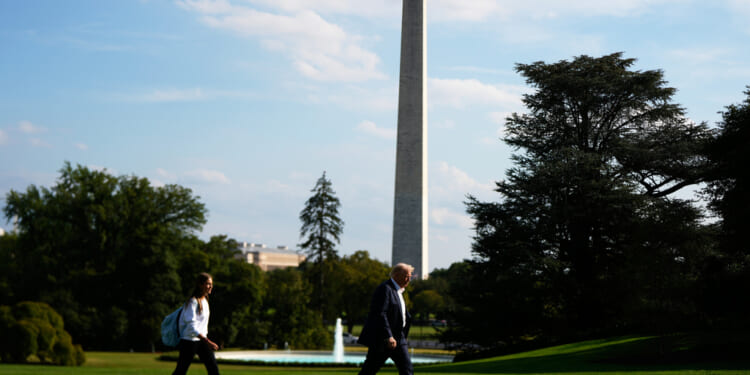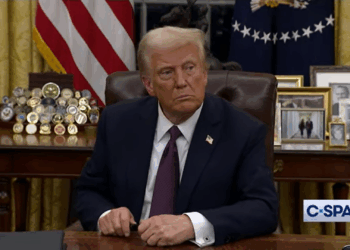President Donald Trump’s push to avoid a government shutdown might produce an unexpected casualty: his administration’s pursuit of a possible rescheduling of marijuana.
Trump announced in early August that he had directed his administration to continue efforts launched by former President Joe Biden to reclassify marijuana from a Schedule I to a Schedule III substance.
However, House Republicans worked language into the Commerce, Justice, Science, and Related Agencies appropriations bill that would appear to severely hinder Trump’s plans.
Section 607 of the House bill dictates that “none of the funds appropriated or otherwise made available by this Act may be used to reschedule marijuana” or “to remove marijuana from the schedules established under section 202 of the Controlled Substances Act.”
The Senate’s Commerce, Justice, and Science appropriations package does not include similar language.
White House officials declined to comment on this story, and the threat could prove moot should congressional leadership fail to meet a Sept. 30 deadline to reach an agreement to fund the government to avert a shutdown. In that case, Congress would need a continuing resolution to provide stopgap funding while lengthier negotiations on a full appropriations package for fiscal year 2026 take place.
Still, the language included in the House bill indicates clear resistance from Republicans to one of the president’s directives.
“We’re looking at reclassification, and we’ll make a determination over the next, I would say, over the next few weeks,” Trump said of his marijuana plans during a press conference in early August. “And that determination, hopefully, will be the right one — very complicated subject, you know, the subject of marijuana.”
“Some people like it, some people hate it,” he continued.
Following the president’s announcement, nine House Republicans sent a letter to Attorney General Pam Bondi in opposition to the rescheduling of marijuana.
“Rescheduling marijuana would not only be objectively wrong, but it would also imply to our children that marijuana is safe,” wrote Reps. Robert Aderholt (R-AL), Paul Gosar (R-AZ), Andy Harris (R-MD), Mary Miller (R-IL), Blake Moore (R-UT), Gary Palmer (R-AL), David Rouzer (R-NC), Chip Roy (R-TX), and Pete Sessions (R-TX).
“Marijuana rescheduling will enable criminal activity and harm our kids. We don’t want the smell of marijuana flooding every public space, we don’t want our kids being enticed by deceptive marijuana marketing,” the letter concludes. “We don’t want even more drugs flooding our streets. We respectfully urge you to follow the science and oppose downgrading marijuana.”
The president has significantly softened his stance on the subject since launching his political career.
During his 2016 campaign for the White House, Trump largely painted marijuana as a states’ rights issue, but his first administration would go on to rescind the Cole Memorandum, an Obama-era memo directing the Justice Department against pursuing marijuana prosecutions in states where marijuana had been legalized. And his Office of Management and Budget submitted a budget for fiscal year 2020 that would have removed state protections for varying degrees of legalized marijuana. Congress did not adopt the provision in its final budget.
But on the 2024 campaign trail, Trump signaled his openness to continuing Biden’s push to reclassify marijuana as Schedule III, and he came out in favor of Florida’s 2024 ballot initiative to legalize marijuana, though that eventually failed.
Trumpworld insiders told the Washington Examiner that, truthfully, the president doesn’t hold any strong views on the subject but believes that marijuana reform could help Republicans gain support among young voters in particular.
Polling published last year by Gallup found that support for legalizing marijuana remained at record highs — encroaching on 70% — with support generally decreasing in accordance with age.
It’s worth noting that moving marijuana from Schedule I, alongside the likes of heroin and cocaine, to Schedule III would not federally legalize the drug. However, the move would significantly reduce federal criminal penalties for marijuana possession and distribution and open up legal marijuana businesses to standard business tax deductions.
TRUMP ADMINISTRATION ‘CONFIDENT’ IN A HOUSING MARKET REBOUND
Furthermore, Trump himself has commented on how rescheduling marijuana would broaden avenues for medical marijuana research.
“I’ve heard great things having to do with medical, and I’ve had bad things having to do with just about everything else. But medical, and, you know, for pain and various things,” he said during his August press conference.















